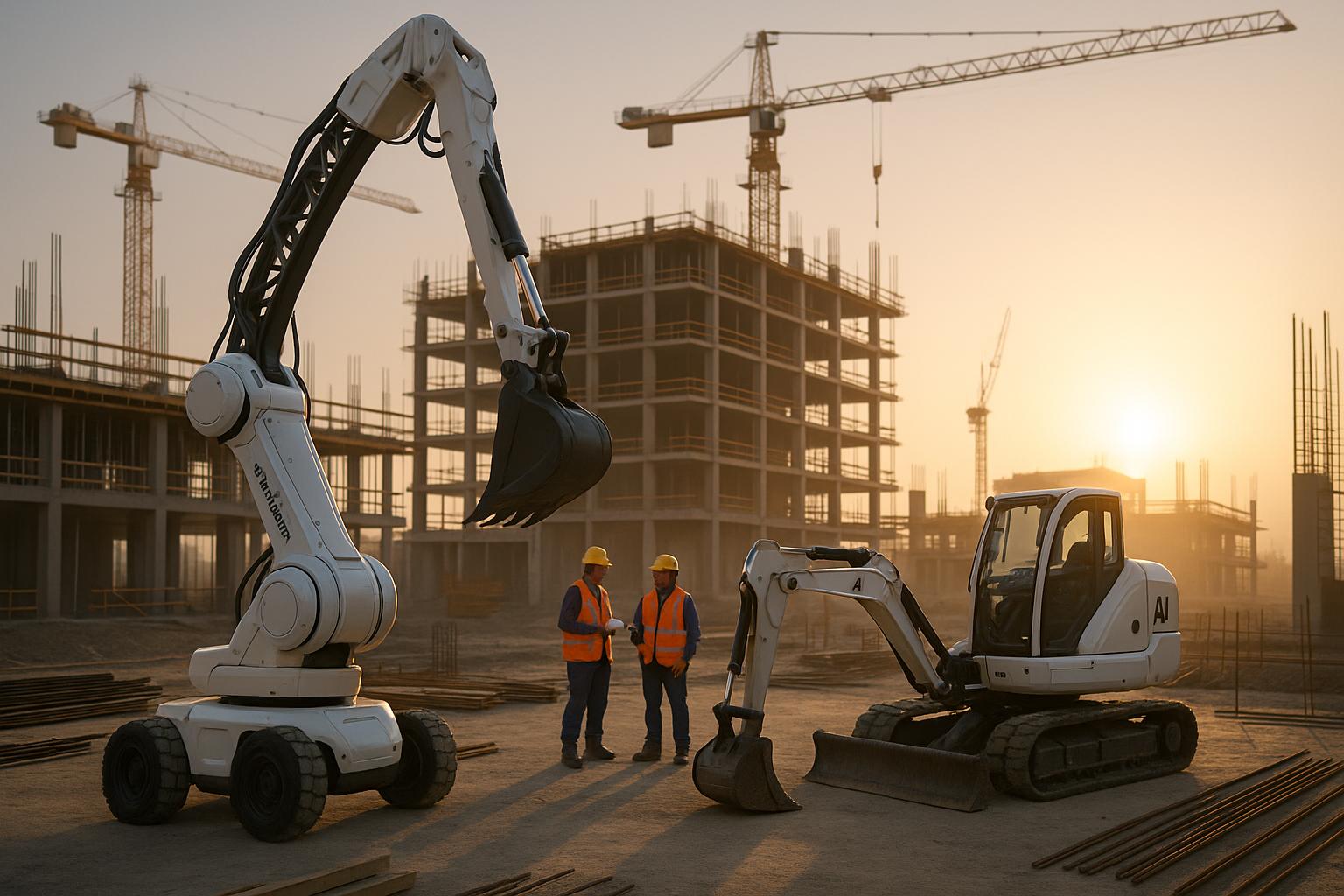Construction AI Startups vs Big Tech: Who’s Winning the $500B Market
Huzefa Motiwala September 15, 2025
The $500 billion U.S. construction market in 2025 is a battleground for AI innovation. Startups and Big Tech are competing to reshape the industry, each with distinct approaches. Startups focus on solving specific construction challenges like safety monitoring, project scheduling, and material efficiency. Their smaller size allows them to move fast, deliver tailored solutions, and build trust with contractors through hands-on experience.
Big Tech, on the other hand, leverages its massive resources to create large-scale platforms that integrate AI with project management, analytics, and compliance tools. These systems cater to large firms needing enterprise-wide solutions but often lack the industry-specific focus startups provide.
The competition is clear: startups excel at addressing niche needs quickly, while Big Tech dominates with scalability and integration. In some cases, the two even collaborate, combining specialized tools with enterprise-level systems to meet diverse construction demands.
Quick Comparison
| Factor | Startups | Big Tech |
|---|---|---|
| Speed | Faster development cycles | Slower, large-scale projects |
| Customization | Tailored to construction needs | Broader, less specific solutions |
| Scalability | Best for smaller firms or projects | Ideal for large-scale operations |
| Pricing | Flexible, per-project fees | Higher, enterprise-level pricing |
| Integration | Focused tools | All-in-one platforms |
Both approaches are shaping the construction industry, with startups driving targeted improvements and Big Tech providing the backbone for broader adoption. Contractors are increasingly blending tools from both to maximize efficiency and results.
Meet the Startups: Artificial Intelligence in Construction
Construction AI Startups: Speed and Specialized Focus
Construction-focused AI startups are carving out a strong position in the industry by offering specialized solutions and moving quickly to address specific needs. Unlike Big Tech companies, these startups are laser-focused on solving the unique challenges that construction professionals face every day.
Targeted Solutions for Construction Challenges
These startups thrive by addressing long-standing pain points in the construction industry. Instead of trying to cater to everyone, they focus on solving specific issues like inefficient project scheduling, safety compliance tracking, or reducing material waste.
For example, a general contractor managing a $50 million commercial project has vastly different needs compared to a residential builder working on custom homes. Understanding this, these startups develop AI tools tailored to specific scenarios. Think real-time progress monitoring using computer vision, predictive maintenance for heavy machinery, or automated quality control inspections.
What sets these companies apart is their deep connection to the construction world. Many founders have firsthand experience in the field, giving them a clear understanding of the tough conditions on job sites – muddy boots, unpredictable weather, and workers who may not be tech-savvy. This practical insight ensures that their solutions are built to handle the realities of construction environments.
Quick Development and Adaptability
Speed is one of the biggest advantages construction AI startups have over larger companies. While Big Tech often gets bogged down by lengthy approval processes and layers of bureaucracy, startups can adapt quickly to changing market demands.
This agility shows up in their ability to release minimum viable products (MVPs) within months, not years. These early versions are tested on actual construction sites, allowing startups to gather feedback and make rapid improvements. If a feature doesn’t work well in practice, they tweak it. If it solves a real problem, they double down.
Startups also benefit from leaner operations, which enable faster decision-making. For instance, if a construction manager requests a new feature for tracking equipment or monitoring safety, startup teams can often implement these changes in a matter of weeks. This responsiveness helps build trust and loyalty with early users, who often become enthusiastic advocates for the technology.
This fast-paced approach allows startups to create tools that can completely reshape traditional construction workflows, offering a sharp contrast to the slower, more generalized methods of Big Tech in the construction AI space.
Examples of Emerging Construction AI Startups
Several new players in the construction AI space are already making waves by rethinking how projects are planned, managed, and executed. These startups are tackling everything from on-site safety to project planning with AI solutions designed specifically for construction.
Some focus on computer vision technology, using AI to monitor worker safety, track project progress, and identify potential hazards before accidents occur. Unlike general-purpose vision systems, their algorithms are trained specifically on construction site imagery, making them far more precise.
Others are leveraging predictive analytics to improve project timelines and equipment management. By analyzing historical data, weather patterns, and resource availability, these tools help contractors avoid delays and allocate resources more efficiently.
Document processing is another area where construction startups are excelling. AI-powered systems can now parse complex architectural drawings, extract critical details from contracts, and automatically generate compliance reports – saving time and reducing errors.
What unites these startups is their deep understanding of how construction works. They’re not just applying generic AI tools to the industry – they’re rethinking how AI can fundamentally improve the processes that drive project success. By focusing on niche problems, they’re delivering solutions that are tailored to the unique demands of construction professionals.
Big Tech: Large Scale Resources and Connected Systems
With the $500 billion construction industry pushing for advancements and efficiency, Big Tech is stepping in with its vast resources to redefine the way things are done. By leveraging their global infrastructure, financial muscle, and interconnected systems, these giants are delivering capabilities that smaller companies simply can’t match.
Massive Infrastructure and Data Capabilities
Big Tech operates on a scale that’s hard to rival. Their worldwide network of servers offers the computational power needed to process real-time construction data from multiple sites across various regions – all at once.
While startups might focus on a handful of construction projects, Big Tech can handle operations on a national scale. This allows them to train AI models that identify patterns and provide insights across the entire industry, not just isolated sites.
Their ability to connect a wide range of devices – like sensors and equipment monitors – creates a comprehensive data ecosystem that smaller companies often struggle to replicate. And with their deep pockets, Big Tech can afford to invest in long-term AI projects that may take years to deliver results, something startups rarely have the resources to pursue.
All-in-One Platforms
Big Tech doesn’t just build tools – they create entire ecosystems. Their platforms combine AI with project management, collaboration tools, analytics, and compliance tracking, offering construction firms a one-stop solution for managing operations.
These integrated systems are particularly appealing to large construction firms juggling multiple projects. General contractors can use these platforms to coordinate teams, monitor progress, manage budgets, and ensure compliance – all while benefiting from AI-generated predictive insights.
What’s more, Big Tech ensures that their platforms work seamlessly with existing enterprise systems, like accounting software and supply chain management tools. This integration reduces the learning curve and streamlines operations, making adoption smoother for construction companies.
As more companies use these platforms, the data collected enhances AI models, which in turn improves insights across the board. This network effect makes Big Tech’s solutions even more powerful over time.
Challenges with Niche Needs
Despite their strengths, Big Tech faces hurdles when it comes to addressing the unique demands of the construction industry. Their broad, one-size-fits-all platforms often fall short of capturing the specific workflows and details that vary between different types of construction projects.
For example, tools designed for general business operations might work well in an office setting but struggle on construction sites where rugged conditions and unreliable connectivity are common. And when construction managers request specialized features, the bureaucracy within Big Tech can lead to delays – something startups, with their agility, can address much more quickly.
There’s also an issue of trust. Many construction professionals remain wary of tech companies that lack deep industry experience. They worry that Big Tech views construction as just another market rather than a field with unique challenges requiring tailored solutions.
This gap between generalized tools and specialized needs creates opportunities for competition. While Big Tech offers comprehensive platforms, startups can step in with niche solutions that excel in specific areas, paving the way for both rivalry and collaboration as the industry continues to embrace new technologies.
sbb-itb-51b9a02
Direct Comparison: Startups vs Big Tech in Construction AI
The competition for the $500 billion construction AI market highlights the differences between nimble startups and established tech giants. Each has strengths that cater to different parts of the construction industry, and success often depends on matching the right solution to a business’s specific needs.
Main Differences
One standout difference is the speed of innovation. Startups in construction AI are known for their agility, quickly adapting their products to meet changing demands. This flexibility allows them to pivot and deliver niche features – like project tracking or equipment maintenance solutions – without long delays. On the other hand, Big Tech companies operate on longer development cycles, focusing on solving broader challenges that require extensive resources.
Big Tech brings the advantage of scale. These companies use their vast resources to create platforms capable of analyzing data from numerous construction sites, offering insights that smaller startups may struggle to replicate.
Another key distinction lies in industry expertise. Startups often have teams with direct construction experience – think former project managers, engineers, and supervisors – who understand the unique workflows of different projects. Big Tech, however, typically relies on general software teams, which can result in solutions that are less tailored to the construction sector’s specific needs.
Pricing models also vary significantly. Startups usually offer flexible pricing, such as per-project or per-user fees, making their tools more accessible to smaller and mid-sized contractors. In contrast, Big Tech often uses enterprise licensing models, bundling AI tools with broader software solutions, which appeals to larger firms that need integrated systems. These pricing approaches reflect the broader differences between the two.
Comparison Table: Strengths and Weaknesses
| Factor | Construction AI Startups | Big Tech |
|---|---|---|
| Development Speed | Rapid iteration and frequent updates | Longer, deliberate product cycles |
| Industry Customization | Deep construction expertise | General business solutions |
| Scalability | Best for smaller-scale projects | Ideal for large-scale operations |
| Cost Structure | Lower per-user or project fees | Higher enterprise-level pricing |
| Integration Capability | Specialized tools for construction | Comprehensive business ecosystems |
| Data Processing | Offers site-specific insights | Excels at analyzing industry-wide patterns |
| Support Response | Direct access to engineers | Tiered, structured support |
| Market Trust | Built on hands-on experience | Backed by established reputation |
These differences are shaping how the construction industry adopts AI solutions, influencing both market trends and contractor preferences.
Market Trends for 2025
These contrasting approaches are already shaping technology choices in the construction sector. In the U.S., mid-sized contractors are increasingly leaning toward startup solutions, which can improve project timelines by 15-25% through targeted operational improvements. Meanwhile, larger contractors often opt for Big Tech platforms that integrate seamlessly with existing enterprise systems. These platforms connect AI insights with critical functions like accounting, procurement, and HR, making them particularly appealing for large-scale operations.
Regulatory compliance is another factor driving decisions. Big Tech’s expertise in meeting data security standards and audit requirements gives them an edge in highly regulated sectors, such as government projects or large infrastructure developments.
Interestingly, many large construction firms are adopting a hybrid approach. By combining the specialized tools from startups with the robust, integrated systems offered by Big Tech, these companies aim to achieve both efficiency and reliability.
Geographic strategies also differ. Startups often focus on localized markets, providing hands-on support to their clients. In contrast, Big Tech deploys solutions on a national scale, catering to firms operating across multiple regions. This ability to roll out solutions quickly reflects the industry’s shift away from slow technology adoption and toward faster implementation.
Practical Advice for Founders and Industry Leaders
The construction AI industry is brimming with opportunities for those who can skillfully navigate the competitive dynamics between startups and Big Tech. Success in this space calls for smart strategies around positioning, forming partnerships, and adopting development practices that play to each side’s strengths.
How Startups Can Compete
Zero in on specific construction challenges like concrete curing, crane scheduling, or safety compliance. By focusing on niche problems, startups can build deep expertise and create solutions that stand out. Spend time with site teams to truly understand the day-to-day hurdles they face – this hands-on approach helps tackle real issues rather than hypothetical ones. Many successful construction AI startups are led by founders with firsthand experience in the industry, which gives them an edge in identifying and addressing these pain points.
When it comes to pricing, consider offering per-project or milestone-based fees. This aligns with how construction companies typically budget, making it easier for contractors to justify costs to their clients.
Another key advantage lies in agility. Use rapid iterations to adapt to on-site feedback quickly. Focus on gathering high-quality, site-specific data that leads to actionable insights. Construction companies value vendors who can deliver effective solutions on tight timelines, making responsiveness a major competitive advantage.
This ability to specialize and adapt also creates opportunities for fruitful partnerships with Big Tech.
Partnership Options with Big Tech
Startups can amplify their reach and impact by teaming up with Big Tech, leveraging their niche expertise to complement the larger players’ resources. By integrating your tools with Big Tech platforms – through APIs, white-label solutions, or data-sharing agreements – you can access enterprise clients while maintaining your industry focus and ensuring data privacy.
Joint go-to-market strategies can be especially powerful in the construction industry, where relationships and trust are critical. Big Tech brings the credibility and sales muscle needed to win over large enterprises, while startups contribute specialized solutions that resonate with construction firms seeking both reliability and fresh ideas.
Methods for Fast Product Development
To make the most of specialization and partnerships, startups should adopt fast and flexible product development methods. A 90-day MVP (minimum viable product) cycle works well for testing core features on real construction sites. Using AI-driven tools can speed up coding, testing, and documentation, helping to reduce risks and validate features early in the process.
Feedback from users should be a cornerstone of your development strategy. Construction professionals are often very direct about what works and what doesn’t, offering insights that can guide your product toward solving real-world problems. Regular check-ins with users ensure your solution stays relevant and practical.
Finally, your choice of technology stack matters. Opt for reliable, well-documented tools over cutting-edge but unproven technologies. The goal is to create solutions that can handle the demanding conditions of construction environments, not just to show off the latest tech trends. Reliability and performance should always take priority over flashiness in this industry.
Conclusion: The Future of Construction AI
The construction AI market, valued at $500 billion, thrives on the combined strengths of specialized startups and major tech players.
Startups bring a sharp focus to solving the industry’s most immediate problems. With their in-depth understanding of jobsite challenges and ability to adapt quickly, they deliver tailored solutions. Whether it’s cutting down on concrete waste or enhancing on-site safety through AI-driven monitoring, these startups address specific needs with precision.
On the other hand, established tech companies provide the backbone for scaling these solutions. Their powerful cloud platforms, advanced data processing, and enterprise-grade security make it possible to move from small-scale pilots to industry-wide adoption.
This synergy between startups and Big Tech creates a collaborative environment where both sides thrive. Startups gain access to enterprise-level resources, while tech giants benefit from the niche expertise startups bring to the table. As discussed earlier, combining specialized tools with large-scale platforms is key to driving success in this market.
For the construction industry, this partnership offers the best of both worlds: innovative tools designed to tackle real-world jobsite challenges, supported by the reliability and scalability needed for widespread implementation. Companies that embrace this collaborative model are poised to secure a strong foothold in the market.
The future of construction AI lies in the seamless integration of specialized innovation with scalable, robust infrastructure.
FAQs
How do AI startups in construction compete with Big Tech in the $500 billion market?
Startups in the construction industry are carving out a niche by offering focused, industry-specific solutions that tackle the sector’s unique challenges head-on. Their smaller size and flexibility give them the ability to innovate quickly and respond to changing demands, making them well-suited to address specific problems.
One of their key strengths lies in utilizing specialized data and workflows that aren’t easily duplicated by larger players. By developing customized platforms and honing in on niche expertise, these startups deliver distinct solutions that stand out in the fast-evolving world of construction AI.
What advantages can construction firms gain by combining AI solutions from startups and Big Tech?
Combining AI solutions from startups and major tech companies allows construction firms to harness the strengths of both. Startups bring specialized tools designed to tackle specific industry challenges with speed and flexibility, making it easier for firms to respond to shifting demands. On the other hand, Big Tech offers large-scale platforms, advanced technologies, and integrated ecosystems that boost efficiency, improve safety, and support smarter decision-making across broader operations.
This blend of innovation and scalability can drive cost reductions, higher productivity, and safer work environments, positioning firms to thrive in the fast-changing $500 billion construction industry.
What challenges do Big Tech companies face in meeting the unique demands of the construction industry?
Big Tech companies often face challenges in addressing the specific needs of the construction industry. Why? Because they lack direct, hands-on experience with the unique hurdles this sector faces. Construction projects are anything but straightforward – they deal with unpredictable jobsite conditions, intricate workflows, and tight deadlines. These complexities demand solutions that are designed with the industry’s nuances in mind.
On top of that, the construction industry isn’t exactly known for quickly embracing new technologies. There’s a natural resistance to change, which makes it harder for large tech firms to roll out their solutions successfully. Add to this the maze of regulatory requirements and compliance standards, and it becomes clear why a one-size-fits-all approach often falls short. This leaves room for nimble, construction-focused innovators to step in and address the gaps left by Big Tech.








Leave a Reply